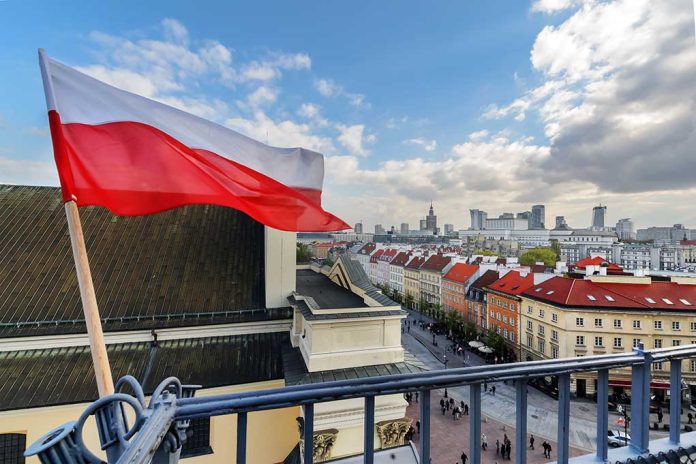
In 2023, Poland has encountered a significant surge in migrant transfers from Germany and other EU nations, totaling over 15,000 individuals.
At a Glance
- Over 15,000 migrants transferred from Germany to Poland in 2023.
- Increased transfers from Norway, Austria, and Sweden.
- Poland’s asylum centers nearing full capacity.
- Calls for reintroduced border controls between Germany and Poland.
- Rising concerns in Germany over migrant influx through Poland.
Rapid Increase in Migrant Transfers
From January 1 to September 15, 15,545 migrants were transferred from Germany to Poland. Lt. Col. Andrzej Juźwiak of the Border Guard confirmed Poland’s acceptance of all transfers. This influx has intensified since June, with 135 individuals transferred by plane in the past three months. Additionally, nations such as Norway, Austria, and Sweden have relocated migrants to Poland under EU readmission agreements. The costs associated with these transfers are covered by the countries initiating them.
This trend has raised significant concerns about Poland’s capacity to accommodate the growing number of arrivals, given that its asylum centers are nearing full occupancy. Calls for the reintroduction of border controls between Germany and Poland, especially in regions like Brandenburg and Saxony, have gained momentum. Polish border guards have reported an increase in irregular border crossing attempts from Belarus, reflecting a broader regional issue.
🇵🇱‼️ JUST IN: Poland accepted 15,545 migrants from Germany since Jan. 1 of this year, with returns soaring in the last 3 months.
Under Donald Tusk's left-liberal government, Poland has suddenly become a dumping ground for Europe's illegal immigrants.
Other countries returning… pic.twitter.com/aTobygvE6d
— Remix News & Views (@RMXnews) September 24, 2024
Complicated Routes and Humanitarian Issues
Migrants often face perilous journeys, with many attempting to enter the EU through Baltic countries, not just Poland. Many were recently issued Russian visas and journeyed through Belarus or Russia, despite the barriers. The increase in migrant crossings at the Polish-Lithuanian border over the previous year underscores the escalating situation. Humanitarian groups are notably active along the Polish-Belarusian border, especially during the spring and post-winter months.
“The migrants mentioned by the German side have come via Belarus or Russia and still have recently issued Russian visas,” says Anna Michalska, a Polish Border Guards’ spokesperson.
Migrants, predominantly from countries such as Bangladesh, India, Eritrea, and Ethiopia, often endure force and injuries from border guards. They undertake dangerous crossings, including scaling border walls and traversing rivers and swamps, resulting in harsh conditions within Poland’s forests. Despite these challenges, many migrants aim to reach other European countries like France. Notably, despite the presence of a border wall, the migrant route through Russia and Belarus remains active.
Poland has called on Germany to explain an incident in which German police transported a group of migrants to the Polish side of the border and left them there.
A German spokesman says they are Afghans with refugee status in Poland so had to be returned https://t.co/QG7ACX7Fb7
— Notes from Poland 🇵🇱 (@notesfrompoland) June 17, 2024
Political and Security Dimensions
Germany has seen a rapid influx of migrants and refugees entering from Poland, causing fears of a repeat of the 2015 migrant crisis. The EU accuses Belarus’s leader, Alexander Lukashenko, of weaponizing immigration as retaliation against EU sanctions. Lukashenko allegedly lured migrants from conflict zones like Iraq and Syria to Minsk with promises of EU entry. Discussions about reinstating border checks between Poland and Germany are ongoing, posing a challenge to the EU’s open borders policy.
“Germany feels helpless,” said Gerald Knaus, chairman of the European Stability Initiative and an advisor on migration issues to German politicians.
Poland seeks support from European allies amidst escalating tensions at its eastern border with Belarus. Poland’s defense minister, Władysław Kosiniak-Kamysz, has requested police and border guard support from Germany and France. The crisis is framed as a hybrid, organized action against Western civilization, not merely a migration issue. Poland blames Russia and Belarus for orchestrating these actions and has increased border security measures accordingly.
“I have asked for support in this area—not military support, but police support and border guard support.”
Alongside Estonia, Latvia, and Lithuania, Poland has called on the EU to bolster its eastern border defenses against such hybrid attacks. This situation highlights the need to balance national security with humanitarian concerns, carrying significant implications for future EU border and immigration policies. Public support for refugees in Poland has dwindled since the onset of Europe’s migration crisis, driven by cultural, social, economic, political, and security fears.
Sources:
- https://www.euronews.com/2023/05/25/influx-in-migrant-crossings-at-poland-belarus-border-raises-concerns-in-germany
- https://www.cbsnews.com/news/belarus-poland-crisis-migrant-refugee-influx-germany-eu/
- https://etias.com/articles/poland-seeks-european-support-amid-escalating-border-crisis
- https://www.migrationpolicy.org/article/diminishing-solidarity-polish-attitudes-toward-european-migration-and-refugee-crisis
- https://migrant-integration.ec.europa.eu/country-governance/governance-migrant-integration-poland_en
- https://www.ceeol.com/content-files/document-148460.pdf
- https://www.ncbi.nlm.nih.gov/pmc/articles/PMC10001563/
- https://www.voanews.com/a/poland-says-belarus-russia-organizing-new-migrant-influx/7214946.html










